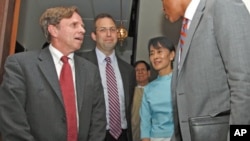Senior U.S. State Department officials who visited Burma this week say they had constructive meetings with leaders of the new civilian government and the Burmese military. They say the United States is prepared to reciprocate for Burmese reform steps by easing restrictions on the reclusive East Asian country.
The three-day visit by State Department human rights chief Michael Posner and special envoy for Burma, Derek Mitchell, was the latest step in an accelerating U.S.-Burmese dialogue, and both said they are encouraged by reform steps by the new nominally-civilian government.
The United States was skeptical that the new government, which took power in late March after decades of military rule, would bring meaningful change.
However Mitchell and Posner, in comments to reporters Friday at the U.S. embassy in Rangoon, also disclosed here, said reform moves by the new authorities appear to reflect the beginning of a transition that the United States welcomes.
Among other things, the Burmese government has released about 200 political prisoners, and advanced an election law that would legalize opposition parties including Nobel Laureate Aung San Suu Kyi’s formerly-banned National League for Democracy.
Posner and Mitchell met with a range of senior Burmese government officials including the country’s military chief of staff in the new capital Nay Pyi Taw, and went on to Rangoon to meet Aung San Suu Kyi and other political and human rights activists.
Briefing reporters here, State Department Spokeswoman Victoria Nuland said Posner pressed authorities to free all the country’s estimated 1,800 remaining political prisoners, and that the assistant secretary of state for Democracy, Human Rights and Labor raised specific cases.
“All political prisoners should be released. There was some lack of transparency at least, in our view, in terms of who has already been released and who remains in custody," said Nuland. "So this was Assistant Secretary Posner’s first trip to Burma, and it was his chance to actually sit down with them and get a better sense of who has been released, to talk to them about first of all the general principle that they should all be released, but also talk about additional particular cases of concern.”
Posner and Mitchell said the United States is loosening travel restrictions, allowing Burmese Foreign Minister Wunna Maung Lwin to visit Washington earlier this month.
They said the Obama administration also is considering expanding small agricultural and micro-finance aid programs, but that a further easing of relations will depend on what Mitchell termed “concrete changes” by the Burmese.
He said if there is evidence of genuine reform, the United States “will be partners in that effort,” though noting that the lifting of key sanctions, including a law barring U.S. support for international loans to Burma, would require action by the U.S. Congress.
US Envoys See 'Encouraging Steps, Signs' in Burma




